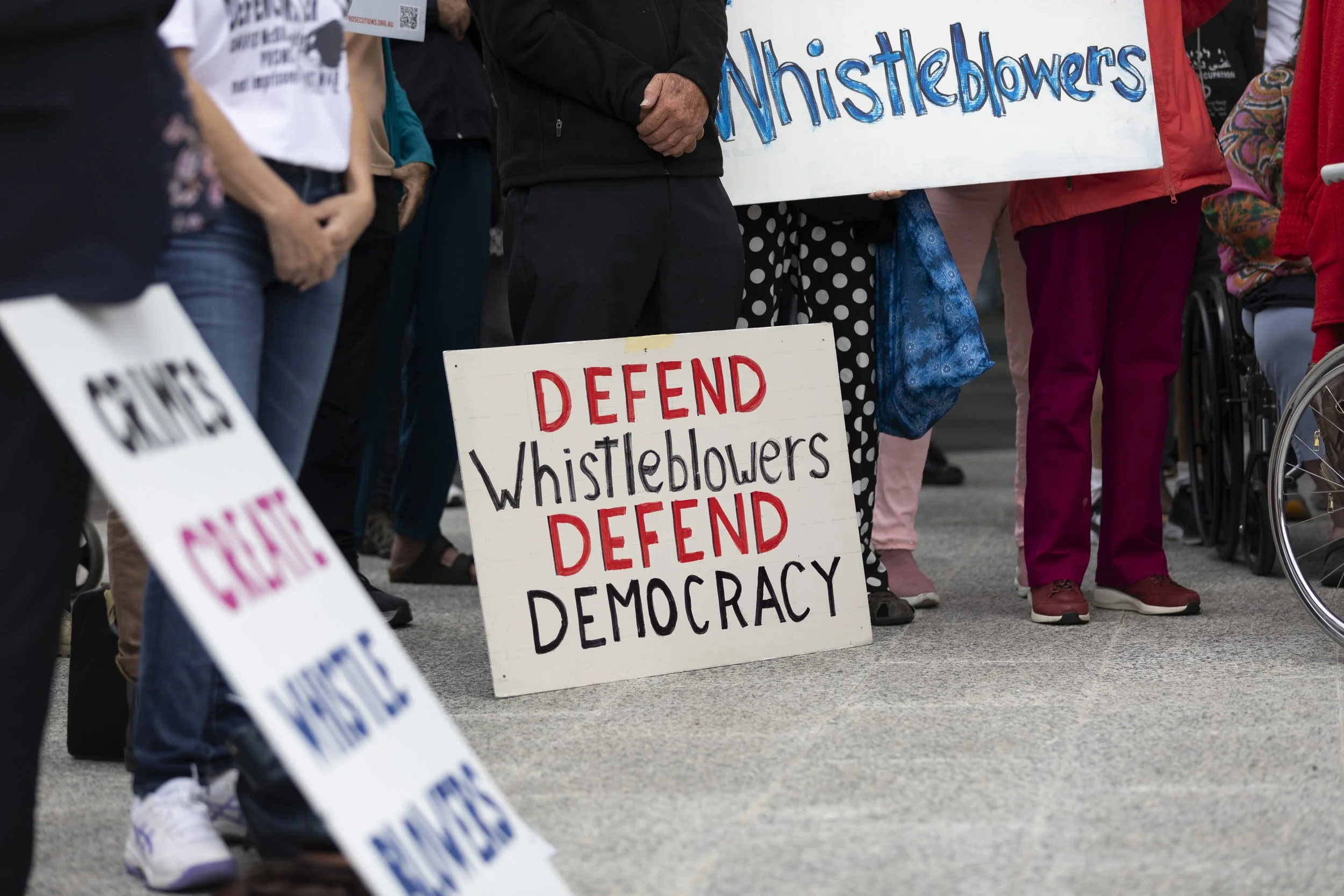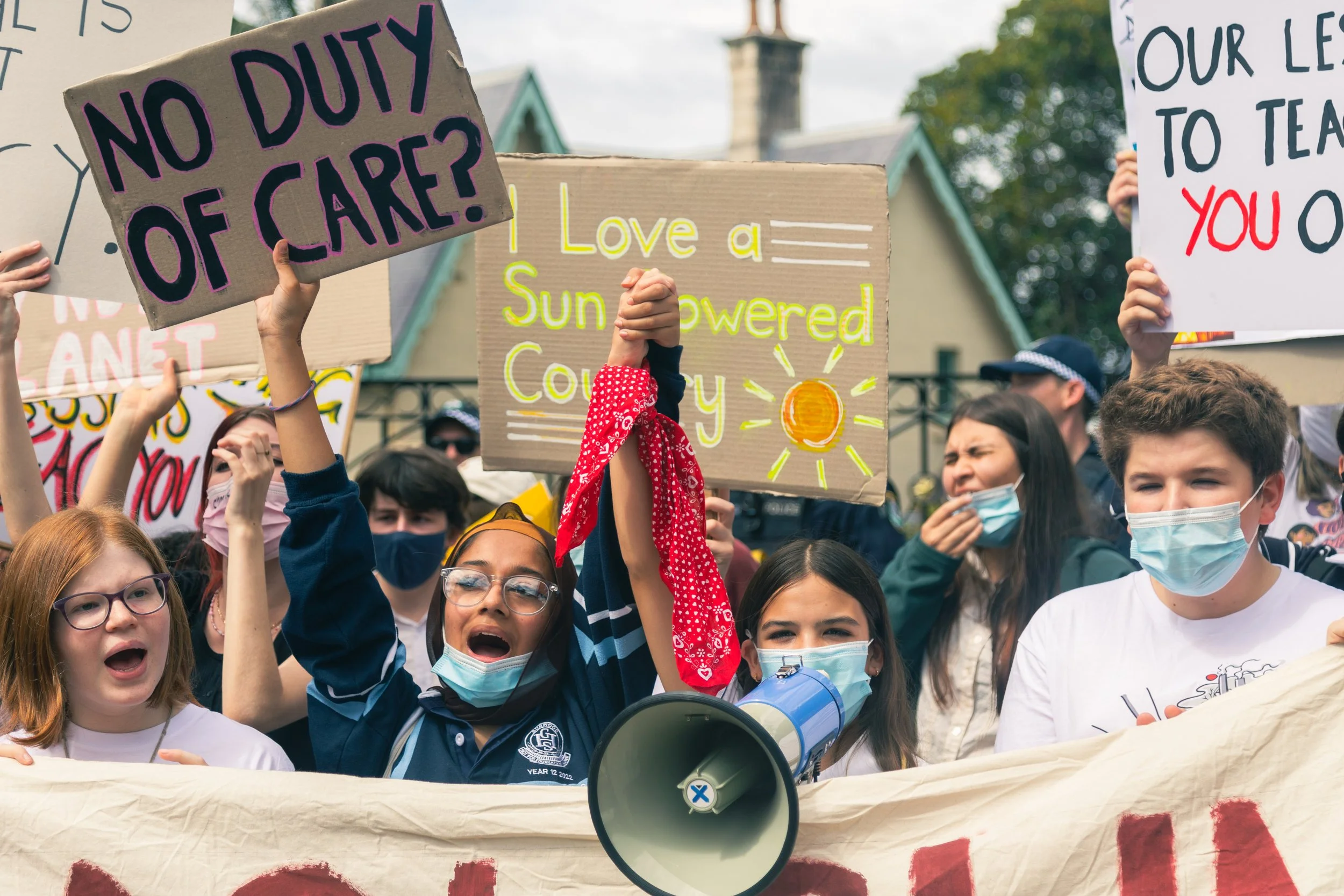An urgent complaint has been made to the United Nations about Australia’s discriminatory youth justice systems and how they seriously violate the human rights of Aboriginal and Torres Strait Islander children.
Read MoreThe Human Rights Law Centre calls on all parties and independents at the 2025 Federal Election to put human rights at the heart of government decision making and improve the dignity, equality, and fair access to justice for all people in Australia.
Read MoreCommissioned by the Human Rights Law Centre and authored by Professor Jessie Hohmann from the UTS Faculty of Law, this new report shows how an Australian Human Rights Act could person should have a safe, secure and healthy place to call home, regardless of their postcode or bank balance.
Read MoreWhistleblowers make Australia a better place by speaking up about wrongdoing and corruption. The Human Rights Law Centre's Whistleblower Project is making it easier for you to access the legal information about your rights while considering whether or not you need to make a disclosure. Our team have produced these legal information guides for public and private sector workers.
Read MoreWhistleblowers raising concerns about harmful digital platforms and holding technology companies to account will be supported by a new practical guide, released by The Human Rights Law Centre, Reset Tech Australia, Psst and Digital Rights Watch.
Read MoreThe Human Rights Law Centre is working with communities in Bougainville to seek justice for the environmental devastation left by Rio Tinto’s former Panguna mine. A major independent investigation, the Panguna Mine Legacy Impact Assessment has been released today and confirms what communities have said for decades: they are living with an environmental and human rights disaster.
Read MoreStop the SLAPP shines a light on the rise of Strategic Litigation Against Public Participation (SLAPP) being used in Australia by the powerful and the wealthy.
Read MoreThe Prison to Deportation Pipeline, a new joint report from the Human Rights Law Centre and the University of Melbourne has found that visa cancellations on character grounds has increased tenfold in last ten years.
Read MoreThe Human Rights Law Centre is calling on the Albanese Government to combat misinformation which is poisoning Australia's democracy as part of a new report: Rights-First: Principles for Digital Platform Regulation.
Read MoreWith the rising influence of fossil fuel industries over Australian politics, the Human Rights Law Centre has produced the Climate and Environmental Whistleblowing Information Guide, a practical resource to support any person to raise concerns about climate and environmental wrongdoing in Australia.
Read MoreThe Protest in Peril report analyses and compiles every single bill across Australia over the last two decades which has impacted upon the right to protest, and has found the right to protest is being steadily eroded in Australia.
Read MoreThe right to protest in Australia is under significant and sustained attacks by governments and increasingly, the fossil fuel industry. The Human Rights Law Centre is calling for governments across Australia to better protect protest rights, by releasing the “Declaration of Our Right to Protest”.
Read MoreThis new report by Reset Australia, summarises a policy roundtable about the need for effective legislative and regulatory interventions on misinformation and disinformation in the context of the proposed Combatting Misinformation and Disinformation Bill (the Bill).
Read MoreThe Migrant Workers Centre, Unions NSW, the Human Rights Law Centre, Immigration Advice and Rights Centre, and Migrant Justice Institute have set out the roadmap for strong and robust visa protections for migrant workers in a new report: Not Just Numbers: A Blueprint of Visa Protections for Temporary Migrant Workers.
Read MoreThis report from the Migrant Justice Institute and the Human Rights Law Centre proposes new whistleblower protections to enable migrant workers to address exploitation.
Read MoreA new report exposes the failure of the Federal parliament in the 2019 –22 term to fulfil its promise to properly consider human rights before voting on legislation. 60% of legislation with human rights concerns was made into law with no review completed by the Parliamentary Joint Committee on Human Rights.
Read MoreThe Australian parliament must reform public and private sector whistleblowing law and establish a whistleblower protection authority, according to this report by Griffith University, the Human Rights Law Centre and Transparency International Australia.
Read MoreBroken Promises: Two years of corporate reporting under Australia’s Modern Slavery Act examines the second year of corporate statements submitted to the Government's Modern Slavery Register by 92 companies sourcing from four sectors with known risks of modern slavery: garments from China, rubber gloves from Malaysia, seafood from Thailand and fresh produce from Australia.
Read MoreA new report by the Melbourne Social Equity Institute and Human Rights Law Centre, Labour in Limbo: Bridging Visa E holders and Modern Slavery Risk in Australia, casts a new light on the continued suffering of people who sought safety in Australia by boat.
Read MoreHuman rights laws in Victoria, the ACT and Queensland are making concrete improvements to people’s lives, particularly by preventing homelessness and promoting health.
Read MoreA new report, Paper Promises? Evaluating the early impact of Australia’s Modern Slavery Act, examines statements submitted to the Government's Modern Slavery Register by 102 companies sourcing from four sectors with known risks of modern slavery: garments from China, rubber gloves from Malaysia, seafood from Thailand and fresh produce from Australia.
Read MoreSelling Out: How powerful industries corrupt our democracy exposes how the powerful fossil fuels, gambling and tobacco industries are taking advantage of Australia’s weak integrity laws and distorting our democratic processes to put their profits ahead of our wellbeing.
Read MoreAs Australia begins to reconnect with the world, this paper highlights the restrictions that continue to prevent travel for many members of the Australian community and for refugees whose resettlement has been delayed, and proposes a pathway for the federal government to ensure no one is left behind.
Read MoreGlobal Warning: the threat to climate defenders in Australia by the Human Rights Law Centre, Greenpeace Australia Pacific, and the Environmental Defenders Office, reveals how the unregulated political influence of the fossil fuel industry is driving political inaction on climate change and the repression of those calling for action.
Read MoreThe Australian Government is deliberately and systematically separating family members and preventing them from reuniting where one family member has sought asylum at Australia’s borders. Refugees are forced to make an unthinkable choice between their safety, their health and being with the ones they love.
Read MoreMining giant Rio Tinto is responsible for multiple human rights violations caused by pollution from its former mine in Bougainville. For 45 years, the Panguna copper and gold mine on the island of Bougainville was majority-owned by the British-Australian mining company, but in 2016 Rio Tinto divested from the mine, leaving behind more than a billion tonnes of mine waste.
Read MoreThis messaging guide seeks to help people and organisations who are advocating for a an Australian Charter of Human Rights and Freedoms to craft their public messages in a way that will energise supporters and convince neutral audiences about the many benefits a Charter will provide to the whole community.
Read MoreThis report shines a spotlight on ten cases of human rights violations involving Australian multinationals. The cases cut across countries and industries, from ANZ’s involvement in financing land grabs in Cambodia to BHP’s role in the Samarco dam disaster in Brazil and Broadspectrum and Wilson Security’s responsibility for alleged sexual assaults on refugee women and children held in offshore detention on Nauru.
Read MoreThis report outlines ten principles guiding how protest should and can be protected and regulated. These principles are rooted in Australia’s Constitution, international law, common law, and general democratic principles. They also draw on international and domestic best practice. They provide a blueprint for a democracy in which the freedoms of expression and assembly are respected and protected.
Read MoreThis report discusses three facets of hate which cause physical, psychological and emotional harm not only to individuals, but to members of the targeted group and other minority communities and damages our community as a whole.
Read MoreThe UN Committee on the Convention on the Elimination of all forms of Discrimination Against Women is an international treaty adopted in 1979 by the UN General Assembly. On 3 July, Australia was examined by the Committee about whether it is complying with its obligations. The Human Rights Law Centre presented an overview of the gaps in protections for women and girls to the Committee.
Read MoreEach year thousands of strip searches are conducted on women in Victoria’s prisons. Strip searches are invasive, humiliating and, in many cases, re-traumatising. They require women to strip naked in front of two prison officers. The Human Rights Law Centre reviewed six months of recent Victorian strip search register entries obtained through freedom of information laws from the two women’s prisons in Victoria.
Read MoreThis report to the United Nations (UN) Committee on the Elimination of Racial Discrimination (the CERD Committee) examines Australia’s compliance with the International Convention on the Elimination of All Forms of Racial Discrimination (CERD).
Read MoreThis report to the United Nations (UN) Human Rights Committee (the Committee) examines Australia’s compliance with the International Covenant on Civil and Political Rights (ICCPR).
Read MoreAustralia is failing to provide a safe and free environment for civil society and to ensure that people are free to speak out and peacefully protest on issues that they care about, said a UN Human Rights expert today. Michel Forst, the UN Special Rapporteur on Human Rights Defenders, has been in Australia for a two-week official visit, meeting with government, MPs and civil society organisations.
Read MoreIn 2013 Prime Minister Kevin Rudd announced that no person seeking asylum by boat would ever be resettled in Australia. Four years on, this joint report from the Human Rights Law Centre and GetUp! calls for the end of offshore processing and the immediate evacuation of the men, women and children held in Australia’s detention camps on Manus Island, and in PNG, and the Republic of Nauru.
Read MoreAustralian governments must act now to safeguard and encourage vibrant debate on matters of public interest. Defending Democracy by the Human Rights Law Centre maps the worrying trend of Australian governments seeking to restrict the free speech of not-for-profit organisations, through practices such as gag clauses in funding agreements and threats to hamstring advocacy groups’ ability to fundraise.
Read MoreThe Human Rights Law Centre and Change the Record collaborated on this report to address the over-imprisonment of Aboriginal and Torres Strait Islander women.The imprisonment rate of Aboriginal and Torres Strait Islander women has skyrocketed 148 per cent since the Royal Commission into Aboriginal Deaths in Custody. Aboriginal and Torres Strait Islander women make up around 34 per cent of the female prison population but only 2 per cent of the adult female population.
Read More







































